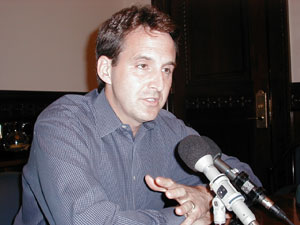Audio
Photos
More from MPR
Your Voice
| |||||||||||||||||||||||||||||||||||||||||||||
Minnesota not so special in effort to solve budget blues
June 17, 2003
Last month, the Minnesota Legislature erased a $4.2 billion projected deficit with a mix of spending cuts, one-time money and payment shifts. The three major Wall Street rating agencies have now rendered their verdict on the budget fix; one agency downgraded Minnesota's credit rating, while the other two said Minnesota still deserves to hold the top rating. State budget experts say Minnesota is among the majority of states reluctant to raise taxes to balance the budget.
St. Paul, Minn. — Minnesota is not unique in its budget woes -- or its budget solution. Corina Eckl, who heads the fiscal affairs program for the National Conference of State Legislatures, says unlike the recession in th early '90s, when many states raised taxes substantially, there is little appetite for tax increases now. Eckl says much of the reluctance stems from no-tax-increase campaign promises.
"That was pretty much the story of the election last year, with lots of governors in particular and also just state legislative leaders and others saying, 'we think we can get through this without additional tax increases,' so Minnesota does not stand out as unique in that regard," according to Eckl.
Eckl says virtually every area of state government has been affected. Her latest state budget update in April found at least 21 states had proposals to reduce funding for K-12 education -- the one area of state government that's usually off limits. More than half of the states were considering cutting higher education, a similar number were looking at cuts in health care funding and also reducing state employee compensation.
"States are continuing to focus largely on the budget side, making additional cuts from cuts they've been making for two and three years now," she said.
Many states are also using one-time funds such as tobacco settlement money, as Minnesota did. Eckl says many states that aren't raising taxes are raising fees to close the budget gap. Many legislatures are still in session, so it's unclear how many states will ultimately raise taxes to balance their budgets.
About a dozen states have raised taxes so far this year, according to the American Legislative Exchange Coalition, a fiscally conservative group. The group's director of tax and fiscal policy, Chris Atkins, argues that states should instead rein in their spending in the wake of the surpluses of the late '90s.
Atkins says Gov. Pawlenty took the right approach by proposing a no-tax-increase budget.
"A lot of governors have given in, particularly on the GOP side. We've seen a lot of GOP governors raise taxes and propose massive tax increases. We've seen it in Alabama with Bob Riley, we've seen it in Idaho with Dirk Kempthorne, in Ohio with Bob Taft, so he's certainly to be commended for sticking with his conservative, no-tax-increase guns."
Atkins says many states have taken a short-term view of their budget problems by depleting budget reserves and gambling that their revenues will rebound. That's an approach the bond rating agencies are skeptical of. When Moody's downgraded Minnesota's credit rating this week, the agency criticized the state for depleting its budget reserves and relying heavily on one-time money to balance the budget.
The chair of the Senate Finance Committee, St. Paul DFLer Dick Cohen, says Senate Democrats made a similar argument during the legislative session. He says the budget fix pushed by Pawlenty and Republican leaders is "put together with bailing wire."
"And simply the fact that a California or a Wisconsin or some other state hasn't put together a budget in any more of a responsible way than Minnesota doesn't negate the fact that we have a budget that's structurally unsound," Cohen says.
Cohen and other Democrats pushed for including tax increases in the budget solution. Cohen says that would have cushioned the impact of budget cuts, and left the state in a better position if the economy doesn't improve.
Gov. Pawlenty says he hasn't ruled out a tax increase if the economy worsens. He downplays the impact of Moody's downgrading decision, pointing out that Minnesota remains in the top 10 states with the highest credit rating.
"Minnesota got hit harder than much of the rest of the nation in terms of the effects of the recession, the number of layoffs, the percent of layoffs. So we've had some economic downturn that is larger than the rest of the nation; our budget deficit is larger on a per capita than most other states, and I think we were probably a little late in responding to it in some respects," Pawlenty said.
The Moody's decision means Minnesota may not get the lowest possible interest rate when borrowing money. But the state just refinanced $392 million in bonds, at a rate of just 2.1 percent, much lower than finance officials were hoping for.
|
News Headlines
|
Related Subjects
|


